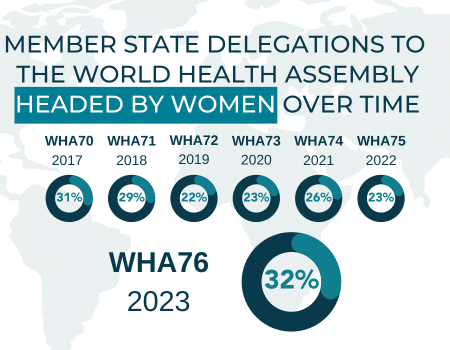PRESS RELEASE: Hope, Progress, and Urgency: Progress on Representation of Women in Health Leadership Roles
May 23, 2023 – Close to a third of national delegations to this year’s World Health Assembly are led by women, a significant improvement in a key gender equity measure that for years has been stuck at less than a quarter of delegations led by women.
The annual count by Women in Global Health (WGH), an organization which campaigns for gender equal leadership and gender equity in global health, revealed an increase of 9% in the number of women occupying Chief Delegate positions at the World Health Assembly (WHA76), bringing their overall representation in decision-making to 32%.
“While we commend those national governments who put women in charge and acknowledge this significant improvement in progress towards gender equal leadership, the basic reality is women are around 70 percent of the overall health workforce and are up to 90 percent of frontline health workers,” said Dr Roopa Dhatt, Executive Director of Women in Global Health.
“For every woman working in health, there are still three men making top-down decisions about health priorities and the design and delivery of health programs.”
“We must recognize the invaluable expertise that women bring to the table and acknowledge that as the World Health Organization (WHO) celebrates its 75th anniversary, we cannot afford to wait another 75 years to achieve gender parity in global health decision-making. When women’s voices are sidelined, we all suffer from the loss of their expertise in delivering health.
“The WHO has a responsibility to address the historic underrepresentation of women in WHA delegations,” states Dr. Roopa Dhatt, Executive Director and Co-Founder of WGH.
WGH and its 49 chapters worldwide call for a significant increase in women-led delegations for the 2024 World Health Assembly, aiming for a target of 50% representation. Governments, as the decision-makers for their delegations, must be held accountable for the marginalization of women’s voices in leadership, especially in a sector where women are the face of healthcare.
“The World Health Assembly serves as the highest standard-setting body in global health. Decisions made at the WHA shape global health priorities, making them crucial in life and death situations for women and girls,” Dr. Dhatt states.
“When men dominate decision-making roles, health systems often favor male perspectives, resulting in systems and services set up to prioritize men’s needs and better-paid positions and promotions going to men, despite them being the minority in the sector. This systemic bias holds women back in their careers and undermines the quality of health systems by disregarding their professional expertise and knowledge.
Women in Global Health’s recent report, “The State of Women and Leadership in Global Health,” delves into gender inequality in leadership and its impact on health system functionality and efficiency. It emphasizes that limited leadership prospects for women contribute to the current Great Resignation phenomenon, which is undermining healthcare systems worldwide.
Dr. Dhatt concludes, “Enhancing opportunities for women in leadership, closing the gender pay gap, and improving working conditions through paid maternity leave and family-friendly policies are essential steps in addressing systemic health issues.”
For media inquiries or further information, please contact:
Joan Bolger
Communications Manager
NOTES TO EDITOR:
Countries with women Chief Delegates: Albania, Andorra, Angola, Argentina, Armenia, Bahrain, Bhutan, Bosnia and Herzegovina, Brazil, Bulgaria, Burundi, Cabo Verde, Canada, Chile, Comoros, Cook Islands, Croatia, Cyprus, Denmark, Estonia, Eswatini, Ethiopia, Finland, Guyana, Iceland, Israel, Japan, Kazakhstan, Kenya, Kyrgyzstan, Latvia, Liberia, Luxembourg, Malawi, Malaysia, Mali, Mauritius, Mexico, Monaco, Mongolia, Montenegro, New Zealand, Nicaragua, Norway, Panama, Philippines, Portugal, Qatar, Republic of Moldova, Saint Kitts and Nevis, Senegal, Seychelles, Slovenia, South Sudan, Sweden, Timor-Leste, Uganda, Uruguay, Vanuatu, Venezuela (Bolivarian Republic of), Vietnam, Zambia.
About Women in Global Health
Women in Global Health (WGH) is the fast-growing women-led movement demanding gender equity in global health. While women represent 70% of the health workforce and 90% of frontline health workers worldwide, they hold just a quarter of leadership positions. Now with supporters in more than 43 countries and 47 official chapters predominantly in low-income countries, Women in Global Health campaigns for equal representation for women in health leadership; equitable pay and ending unpaid work for women health workers; protection and safe and decent work; and the prevention of sexual exploitation, abuse and harassment. These are the essential foundations for strong health systems, Universal Health Coverage and global health security.
Our events calling attention to problems with relevant data, recommendations and proposed solutions about emerging issues and health policy architecture frequently attract Ministers, Ambassadors, Heads of multilateral organizations, health, development and gender leaders, and professionals, representatives of youth movements and NGOs from all over the world.

